ISLAMABAD: The Supreme Court observed on Tuesday it appeared that the April 22 amendments in the Exit From Pakistan (Control) Rules of 2010 had been enforced with retrospective effect.
“This appears to have been done without the authorisation necessary for giving such an effect to amendments in the rules,” said a three-page order which was released during a suo motu hearing on complaints that influential individuals try to undermine the criminal justice system.
The larger bench had last heard the case on Friday, but retired for the day without dictating any order or fixing the next date of hearing.
Chief Justice of Pakistan (CJP) Umar Ata Bandial headed the five-judge larger Supreme Court bench.
Bench asks FIA to submit list of all ‘high-profile cases’
The case will be taken up again on Friday (June 3).
The Federal Investigation Agency (FIA) has been asked to furnish a list of all high-profile cases before the court on that day.
The agency’s director general and its director of law will also attend the hearing on Friday.
It is not clear, the order said, whether ECL rules have been approved by the federal government and, if so, whether beneficiaries of the amendments recused themselves from the meeting or not.
The court order said it must be shown whether avoidance of conflict of interest was duly catered for. Attorney General Ashtar Ausaf was asked to provide the names of beneficiaries who left the country after the amendment in ECL rules.
The order said the court had read separate reports filed by the interior ministry, the director general of FIA and the National Accountability Bureau’s additional prosecutor general.
It said the names of 174 persons named as accused in NAB cases have been removed from the Exit Control List. This was done, prima facie, without consulting NAB authorities and as a result of retrospective implementation of the amendments, the Supreme Court observed.
It asked the NAB authorities to specify the nature of offences allegedly committed by the accused persons whose names were removed from the ECL.
Rai Tahir, the FIA chief, informed the court that Syed Ali Mardan Shah was appointed investigation officer (IO) in an anti-corruption case at Lahore. He had submitted a challan before the court concerned on Dec 10, but was transferred to Karachi in February when Sanaullah Abbasi was the FIA’s director general.
In his place Assistant Director Nadeem Akhtar was appointed as IO on April 26 and told to produce record in the court the very next day. But the new IO has not come to work after he suffered a heart condition on May 13.
Likewise, the FIA director in Punjab, Dr Muhammad Rizwan, was granted leave by the previous DG, Sanaullah Abbasi, with effect from April 11 to April 17.
Through this leave order, he was transferred to the FIA headquarters on expiry of leave by the previous Mr Abbasi. Since then Deputy Director Nazia Ambreen has been holding acting charge of FIA director. All these changes were made by the previous FIA chief.
The report explained that Sikander Zulqernain Saleem, an advocate, and Rao Samiuddin were appointed special public prosecutors by the law ministry in addition to Moazzam Habib.
On April 11 Usman Riaz Gill, who was not a member of the prosecution team, appeared in the court of special judge (central) and submitted an application signed by prosecutor Sikander Saleem as the latter could not appear in the court.
In the application he claimed that the FIA DG had tacitly told him not to appear in the case as the two main accused were going to be the elected prime minister and the Punjab chief minister.
The report explained that Sikander Saleem had not given any evidence in support of his assertion that he was stopped from appearing in the court.
The report said adequate steps had been taken for preservation of the case files and the record was with the FIA’s investigation branch and instructions had been given for protection of the record of the high-profile case.
Published in Dawn, June 1st, 2022













































